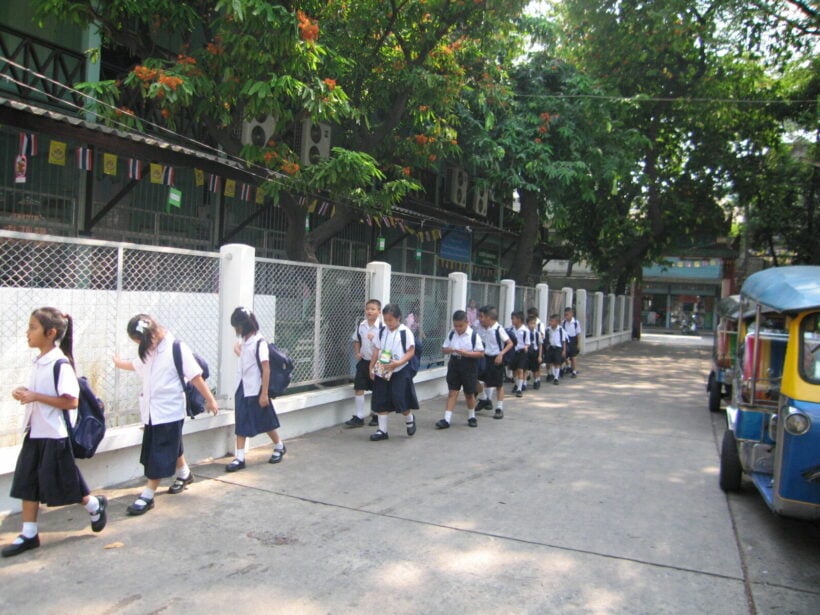Thailand’s education system: Part 1

Thailand’s education system is largely affected by political instability and an increasingly aging populace. As Thailand has seen many military coups, with the recent one occurring in 2014, the climate of political repression has curtailed academic freedom. The consequences are played out daily when Thai academics are forced to work under the constant threat of surveillance, political reprisal, and arrest.
Political instability and an aging population
The wide-reaching use of Thailand’s lèse-majesté laws and other legislation, has resulted in the jailing of many student activists who criticised the monarchy or the pro-military constitution. Thailand’s demographic decline is also having a more immediate impact on the education system as the country’s population is rapidly aging. This causes the student population to shrink and threatens the number of Thai higher education systems.
Back in 2017, Thai education experts warned of the declining demand for education, as well as increased competition from foreign universities. They noted that this could lead to the closure of as many as 3/4 of higher education systems over the next 10 years. And, the United Nations has validated the increasing aging population by saying that Thailand is one of the world’s most quickly aging societies. The share of Thai people over the age of 65 is expected to increase to more than a quarter of the population by 2040. The working age population is also expected to shrink by more than 11% by the same year.
As a result of the aging population, experts say Thailand must stimulate immigration and increase labour force workers’ skills. As Thailand currently has a relatively low-skilled labour force compared to other ASEAN countries, its shortage of skilled labour is evident. Experts say education reforms desperately needed to increase the amount of skilled labourers. But, as Thailand has seen as many as 20 education ministers over the last 17 years, and a military coup that has threatened the progressiveness of the system, the outlook is less than stellar.
Educational reforms
While the current government has put forth a number of educational reforms, critics say these are superficial and aim at promoting political stability. Such things as incorporating The 12 Thai Values into schools by the junta government, seem to only promote adherence and subordinance to the government.
Although the government has put more funding towards the educational system, an OECD and UNESCO study found that the investments are not resulting in the expected outcomes. For example, international test results for Thai students (such as the OECD or PISA study) are still below those of neighbouring countries. And, the study also noted large disparities in student performances in regards to socio-economic levels.
Thai students abroad
Thailand, historically, has not been a big sender of its students abroad to universities. Unlike India, China or Vietnam, Thailand’s percentage of students studying abroad has remained at around 1.3% or lower over the past 20 years. The UNESCO Institute of Statistics also found that Thailand’s outbound degree students has failed to grow by any significant number. Between 2002 and 2016, the number of such students grew by only 10%, while China and Vietnam saw massive growths of 256% and 422% respectively.
Although there doesn’t seem to be a formal study on the motivations of Thai students to study abroad, international educators indicate that an increasingly affluent middle class is helping to drive the demand for high-quality education, foreign language training, and enrollment in prestigious international schools. Although Thailand ranks quite poorly on English proficiency levels, it now has the 2nd highest number of English-medium, private international schools in ASEAN. Indonesia ranks first according to the International School Consultancy Group’s findings back in 2017. If the Thai economy continues to stabilize, the amount of self-funded Thai students who wish to study abroad is expected to grow.
The most popular study abroad destinations for Thai students
The U.S. has historically been the most popular destination for Thai students when choosing to study abroad. As of 2016, the UIS cited that 25% of Thai students who enroll abroad chose the U.S. However, the market share of the U.S. has declined over the past decade in favour of countries like the U.K., where the amount of Thai degree students has almost tripled since 2002.
Thailand as a study abroad destination
Ranking 3rd in Southeast Asia for inbound study abroad students, Thailand attracts more international students than Indonesia or Vietnam. However, it trails that of Malaysia and Singapore. According to the UIS, a large majority of those international students studying in Thailand are from China. U.S. students have also chosen Thailand historically as their first destination to study abroad in Southeast Asia.
But, even as Thailand proves to be quite popular for international students, the political instability has reared its ugly head. Since the 2014 military coup, the UIS showed that the number of inbound degree students dropped sharply by 39%, which is largely thought to be a consequence of the coup.
Thailand, however, continues to remain a low-cost alternative for Indian and Chinese students, as well as having a large number of international study programmes. Other factors such as a free trade area that was initiated in 2015, which resulted in trade liberalisation and the uninhibited flow of educational services, may help Thailand offer further opportunities to advance its competitive position as a study abroad destination among other Asian students.
To see more about Thailand’s education system, check out our Part 2 guide.
Latest Thailand News
Follow The Thaiger on Google News:


























